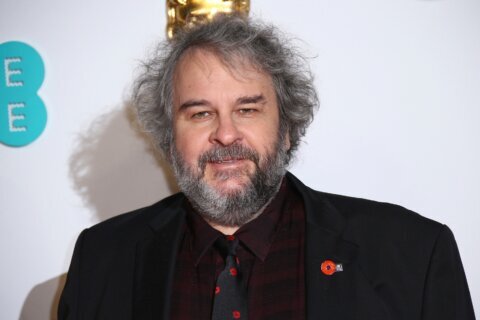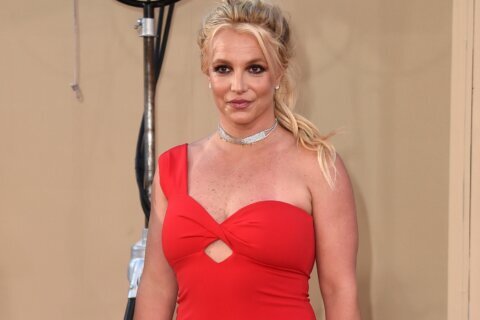This video is no longer available.
Hear our full conversation on my podcast “Beyond the Fame.”
He grew up in Virginia before making history at Duke University and the Detroit Pistons.
NBA legend Grant Hill joined WTOP to discuss his new memoir “Game: An Autobiography.”
“I was thinking about the idea of writing a book,” Hill told WTOP. “I was enshrined in the Naismith Hall of Fame in 2018, so that is a reflective moment naturally. That was the spark that led me to deciding maybe I should do this, maybe the time is right. All the craziness of the last couple of years gave me time to collect my thoughts and share my story.”
Born in Texas in 1972, Hill grew up admiring his father, Dallas Cowboys star Calvin Hill, who was traded to Washington in 1976. As a result, Hill mostly grew up in Reston, Virginia, still rooting for Dallas even though his new home was now in burgundy-and-gold territory.
“Right before I turned 4 years old, we moved to D.C., so that’s where I grew up,” Hill said. “My allegiances were to the Cowboys. In the book I explain why: I was named by Roger Staubach, the iconic quarterback. … I couldn’t let Roger down and betray the Cowboys.”
Football rivalries aside, Hill has fond memories of growing up in Virginia.
“Great memories,” Hill said. “Reston was a beautiful experience, great people, a lot of diversity, very active in sports, I tended to gravitate toward basketball. … The DMV, that’s home. That’s where I came of age. … Of course, there was great basketball in the DMV area. I got it in Reston and in various tournaments and summer leagues in the D.C. area.”
He grew up watching Coach John Thompson’s Georgetown Hoyas in the 1980s.
“The first basketball game that I watched where I fell in love and wanted to one day do that was the 1982 NCAA Championship game when a freshman named Mike Jordan hit the game-winning shot against Georgetown,” Hill said. “I instantly became a fan of both programs and we got season tickets to Georgetown games at the old Caps Center.”
His mom hoped he’d attend Georgetown University, while his dad pulled for UNC.
“Michael Jackson, not the singer but the basketball player, went to my high school, he was older, and he was a freshman on [Patrick] Ewing’s sophomore year, so we followed him in high school and at Georgetown and through him I got to know the program,” Hill said. “My mom preferred Georgetown and my Dad loved Dean Smith, but I fell in love with Coach K.”
Why did he decide to play for Mike Krzyzewski at Duke University?
“He was building his program, his reputation, he was an incredible leader, he really connected with me during the recruiting process,” Hill said. “He was the right fit, he was the right coach. I’m surprised at 16 that I had the foresight to make that tough decision.”
At the time, Coach K still hadn’t won a national title for the Blue Devils.
“There were reservations about Coach K; could he win the big one?” Hill said. “Prior to me arriving, they had been to four Final Fours in five years and could not win the big one, so there was a lot of noise out there: ‘Coach K has a great program but can’t win.’ It’s hard to imagine that now as you’ve seen his iconic, legendary career … but that was a narrative.”
Duke demolished that notion by winning back-to-back NCAA titles in 1991 and 1992 during Hill’s freshman and sophomore years. Of course, Hill is best remembered for throwing a full-court pass to Christian Laettner to hit a buzzer beater in the Elite 8 against Kentucky in 1992. To this day, the play is known as “The Shot,” but it was Hill who threw “The Pass.”
“When I see it played during March Madness, I still get nervous,” Hill said. “That timeout when Sean Woods hit that shot with 2.1 seconds left. … I thought our magical run was over. … Instead of telling me to make the pass, [Coach K] asked if I could do it. … It was an empowering moment. … Christian said, ‘If Grant makes the pass, I’ll make the shot.'”
Hill returned to the title game his senior year, losing to Arkansas, but he was still named ACC Player of the Year in 1994. Drafted No. 3 in the NBA Draft by the Detroit Pistons, Hill signed a $45 million rookie contract, landed Sprite commercials and turned down a Nike endorsement deal in favor of Fila. Even Method Man and 2Pac wore his sneakers.
“It was a whirlwind,” Hill said. “We were so visible at Duke that when I went into the NBA, people knew me. … I had success right away and certainly a lot of attention, commercials and magazine articles, stuff that I’m not even sure I dreamed about. It was all happening quickly, so it was overwhelming and uncomfortable. … This extreme level of celebrity.”
In 1995, he was the first Pistons rookie to score 1,000 points since Isaiah Thomas, sharing Rookie of the Year with Jason Kidd. His second year he led the NBA in triple doubles (10) and the All-Star fan vote over Jordan. After six seasons, he compiled 9,393 points, 3,417 rebounds and 2,720 assists, behind only Oscar Robertson, Larry Bird and LeBron James.
“It was an incredible start,” Hill said. “The first six years I was on this great trajectory, very exciting. One of the things I realized in writing this book is that I didn’t fully appreciate or celebrate it. I was chasing Isaiah, trying to get to this legendary status. I didn’t feel like I deserved to celebrate. … I was constantly pushing forward. What do I have to do to win?”
In 1996, he won a gold medal with “Dream Team 2” at the Summer Olympics in Atlanta.
“I do have the gold medal,” Hill said. “That was an incredible achievement and accomplishment, representing my country, playing on that Olympic world global stage, and playing with some great players: Charles Barkley, Karl Malone, Hakeem Olajuwon, legends of the NBA, so it was really one of the great accomplishments for me personally.”
Tragically, he suffered an ankle injury in 2000, leading to life-threatening complications from surgery that caused him to miss the entire 2003–2004 season. The rest of his career was rather frustrating, bouncing around between the Orlando Magic (2000-2007), Phoenix Suns (2007-2012) and Los Angels Clippers (2012-2013) in the waning years of his career.
“It was life-threatening,” Hill said. “If the surgery didn’t work, the only other option was amputation. … When something traumatic happens, we suppress it to get through. … The process of writing the book, I was really able to unpack the mental and emotional part of going through that whole ordeal. … I realized I still had baggage to deal with and process.”
Who were the toughest opponents that he ever played against?
“The best ever was Michael Jordan, but I didn’t guard Michael, I guarded Scottie [Pippen]. Scottie and I used to battle back in those Detroit days,” Hill said. “The player I had the toughest time against was Kobe Bryant. … Toward the end of my career in Phoenix, I was given the responsibility of trying to guard him. … He was by far the toughest opponent.”
In 2018, Hill was inducted into the Naismith Basketball Hall of Fame, the crown jewel of his post-playing career. Today, he is Director of the USA Basketball Men’s National Team, Co-Owner of the Atlantic Hawks and a TV hoops analyst on CBS and the Turner networks.
“I love the game,” Hill said. “I obviously can’t play it anymore, but to be still work and be around the game and have a number of different roles and responsibilities: Team USA, ownership of the Hawks, television, March Madness, I’m even on the board of the NCAA. … It’s challenging, it’s fun. I’m really fortunate and grateful for that. I just love basketball.”
Hear our full conversation on my podcast “Beyond the Fame.”








